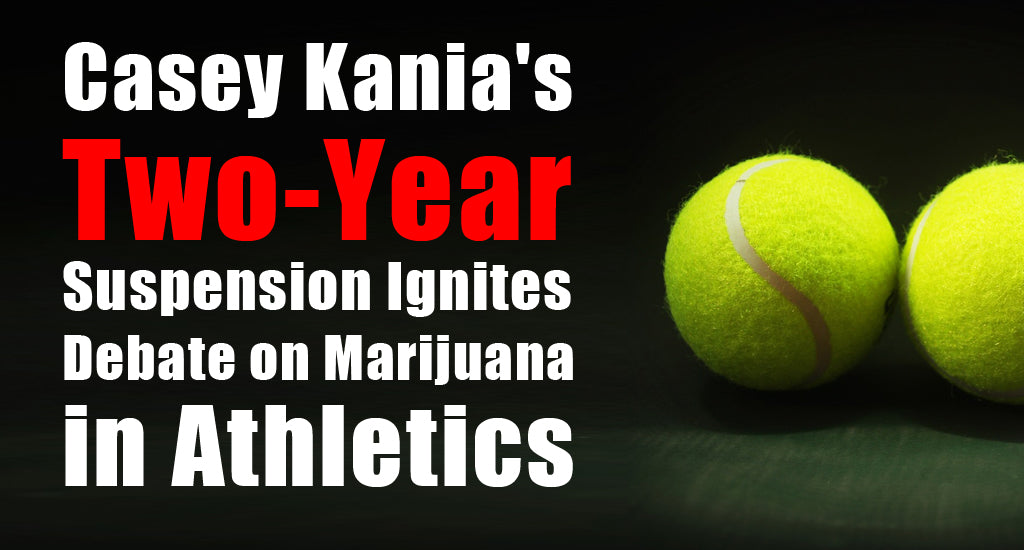
Casey Kania's Two-Year Suspension Ignites Debate on Marijuana in Athletics
In the realm of collegiate sports, where the pursuit of excellence is often shadowed by stringent regulations, former NCAA player Casey Kania finds himself at the center of a burgeoning debate. Kania, whose talent on the field has captivated audiences, recently faced a formidable opponent not in the form of a rival team, but from a substance test. Testing positive for marijuana, Kania has been handed a two-year suspension, sidelining his aspirations and igniting a conversation about the intersection of athletics, cannabis use, and regulation.
The incident came to light following routine drug testing protocols, which remain a staple in collegiate and professional sports oversight. Despite a growing societal shift towards the acceptance of marijuana - both for medicinal and recreational use - the sports world seems to linger in a bygone era where cannabis is viewed through a lens of prohibition and penalty. Kania's case is not isolated but emblematic of a larger issue facing athletes today: navigating the murky waters of cannabis use in an environment that increasingly conflicts with contemporary attitudes towards the plant.
The History of Athletes and Marijuana: A Tangled Web
The relationship between athletes and marijuana use is both complex and historical. For decades, cannabis has been on the sidelines of sports, used by some athletes as a means to manage pain, alleviate stress, and even enhance concentration. However, this usage has often been cloaked in secrecy, given the substance's status on banned substances lists across major sports leagues and organizations.
-
Michael Phelps: The most decorated Olympian of all time, Phelps was suspended for three months in 2009 by USA Swimming after a photograph surfaced of him using a bong. This incident sparked a wide debate about athletes' use of marijuana and its impact on their careers.
-
Ricky Williams: The NFL running back faced multiple suspensions for marijuana use throughout his career, which he has openly discussed as a way to manage pain and mental health issues. Williams' case brought to light the strict policies of professional sports leagues on cannabis use and its consequences for players' health and careers.
-
Nick Diaz: The MMA fighter has been a vocal advocate for cannabis, facing suspensions and fines from the Nevada State Athletic Commission for testing positive for marijuana. Diaz's situation highlighted the discrepancy between the evolving legal status of marijuana and the rigid stance of sports regulatory bodies.
-
Tim Lincecum: The MLB pitcher was cited for marijuana possession in 2009, which did not lead to a suspension but fueled the conversation about cannabis use in baseball. Lincecum's case demonstrates the varying degrees of penalties and public scrutiny athletes face across different sports.
-
Ross Rebagliati: The Canadian snowboarder was initially stripped of his Olympic gold medal in 1998 after testing positive for marijuana, only to have it reinstated since cannabis was not on the banned substance list at the time. Rebagliati's ordeal was one of the first high-profile cases that questioned the rationale behind marijuana prohibitions in sports and led to changes in testing policies.
The history of cannabis in the athletic sphere is a tale of contradiction. On one hand, anecdotal evidence and emerging scientific research suggest potential benefits for recovery and mental health. On the other, regulatory bodies and anti-doping agencies uphold policies that strictly prohibit its use, citing fairness and player health concerns. This dichotomy has led to numerous high-profile cases where athletes were penalized, much like Casey Kania, sparking debates over the need for policy reforms in light of changing laws and societal norms regarding cannabis.
The Puzzling Persistence of Marijuana Prohibitions in Sports
It's a puzzling scenario: as more states and countries embrace the legalization of marijuana, the sports world remains steadfast in its resistance. This steadfast approach raises questions about the rationale behind such strict regulations against cannabis, especially when contrasted with the treatment of other substances like alcohol and prescription medications.
The persistence of marijuana prohibitions in sports is often justified by concerns over performance enhancement, player health, and the integrity of the game. However, critics argue that the scientific basis for these claims is tenuous at best, and at worst, ignores evidence suggesting that cannabis can be less harmful and more beneficial than some substances that are permitted within the regulations.
Furthermore, the testing for marijuana among athletes highlights a broader issue of privacy and personal freedom. With the shifting legal landscape, the rationale for continuing to penalize players for cannabis use becomes increasingly convoluted, begging the question of whether sports organizations will adapt to changing times or remain entrenched in outdated stances.
Conclusion: Reevaluating Cannabis Policies in Sports - A Call for Change
The suspension of Casey Kania is more than just a setback for an individual athlete; it's a symptom of a larger, systemic issue that plagues the world of sports. As society progresses in its understanding and acceptance of marijuana, the sports industry stands at a crossroads. Will it cling to antiquated notions and punitive measures, or will it seek to understand and integrate a more nuanced approach to cannabis?
The case for reevaluating and potentially reforming cannabis policies within sports is compelling. Such reforms could align sports organizations with contemporary societal norms, prioritize the health and well-being of athletes, and acknowledge the evolving landscape of cannabis research and legislation.
In moving forward, the sports world has an opportunity to redefine its relationship with marijuana, transitioning from a stance of prohibition to one of informed regulation. This shift could not only benefit athletes like Casey Kania but also reflect a broader commitment to fairness, health, and progress.
Leave a comment
Comments will be approved before showing up.



